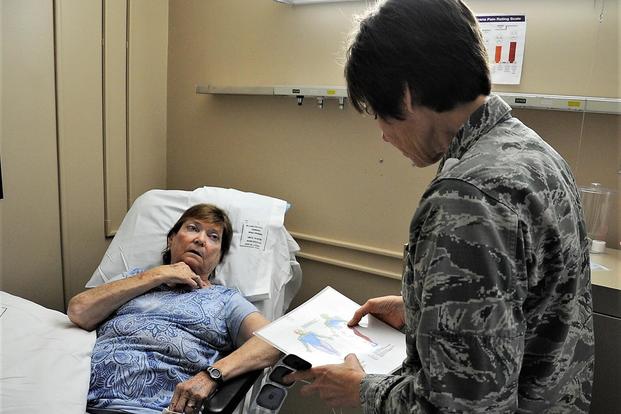The contractors responsible for managing Tricare's system across the U.S. are still struggling to meet standards almost five months after starting, a top Tricare official told Military.com last week.
A series of major changes pushed live by Tricare on Jan. 1 included a reconfiguration of the system's plans; a downsizing of regions from three to two -- Tricare East and West; and the start two new management contracts. Health Net Federal Services now oversees Tricare's system in the West, while Humana is responsible for the East region.
But the system immediately ran into major snags, caused in part by the magnitude of the rollout.
Problems ranged from frustrating to comical.
- A blackout period over December put in place for the updates resulted in a backlog of new enrollments, referral processing, provider change requests and lost payment updates for many users.
- A series of contradictory letters sent by both Health Net and Humana caused widespread confusion among beneficiaries.
- Care providers complained of incorrect or slow payments.
- Users who misdialed Humana's 800 number found that the correct number was one digit removed from what appears to be a sex hotline.
- Thousands of users remain at risk of disenrollment because they either did not update payment information or their updates were lost.
Now, months after those changes were put in place, both Humana and Health Net remain on "corrective action plans," an official process started when contractors fail to meet standards, Ken Canestrini, who directs Tricare for the Pentagon's Defense Health Agency, told Military.com in a wide-ranging interview at DHA headquarters May 8.
Currently, Health Net is on two corrective action plans, he said, while Humana is on one.
Humana's woes center around accurately processing claims, an issue that has caused problems with network providers, he said. That problem stems from Humana's decision to move to a pair of new contractors for claims and finances, he explained.
But Tricare itself could have lessened that issue by doing a better job of warning providers that changes were coming that might impact claims processing for a short time, Canestrini said. "We probably could've done better communicating with providers through our contractors."
Health Net's issues are more serious, he said.
Because the previous contractor, United Health Services, did not sell Health Net its provider network when it left the system, Health Net started building its network from scratch, an issue not faced by Humana in the East. That left it scrambling to both contact providers and update provider lists.
The result, Canestrini said, has been users left without doctors in their areas and inaccurate information on who in the region does or does not accept Tricare plans.
The contractual coverage standard is in-network access to care in all 71 Tricare Prime Service Areas in the region, and access to an in-network doctor in 85 percent of Tricare Select areas, he said.
Currently, Health Net is meeting that standard in 80 percent of Prime Service Areas. But in Tricare Select areas, which are typically more rural and remote from a Military Treatment Facility, the problem is much greater, he said.
To tackle it, Health Net has created 12 areas to focus on first, he said. After those are complete, it will look more broadly to the rest of the region.
Canestrini said he expects the Prime Service Area requirement to be met by June. But the Select network build-out is going to take a lot longer, he said.
Health Net so far has developed only two of the 12 initial areas. And it could be 2021 before the entire region is complete, he said. That's the date by which Congress ordered Tricare must show network completion before all retirees will be required to pay for Tricare Select enrollment.
"Congress recognized that this would be some tough work because they gave us until 2021," Canestrini said.
Meanwhile, Health Net is on the cusp of recovering from another problem that started Jan. 1: overwhelming volume at its call centers.
May 7 was the first Monday since the rollout that Health Net met the standard of a 90 percent call answer rate within 30 seconds of the caller being placed on hold, and a call abandonment rate less than 5 percent, Canestrini said. It also marked the first time the system had met the standard for five business days in a row.
Despite the myriad system issues caused largely by contractor failures, Canestrini said the problem that surprised him most was the failure of beneficiaries who use plans that require monthly enrollment, such as Tricare Reserve Select, to update their payment information after the switch.
Letters were sent to those users last year saying that they needed to update their monthly payment information by late December. But the updates of many who made the change in December as they were told were lost due to the system blackout.
And other users said they never received notice of the update requirement. As a result, those users haven't been charged their monthly premiums since January, creating a requirement for back payments.
Canestrini said those users' lack of follow-through and failure to notice that they had not made payments was the most surprising snafu.
"The one I kind of scratched my head a little bit about is, you know, the electronic fund [and] credit card issue," he said. "What got me is how you could go this long without people getting charged for the care, the premium, and nobody coming up on the net."
Given the size of the changes to the Tricare system, Canestrini said he believes the changeover and update process went well overall.
"I think we did well. I think we took this massive undertaking and came out the other end," he said.
-- Amy Bushatz can be reached at amy.bushatz@military.com.















